
Australia’s school staff are resoundingly confident in their roles despite taking on higher workloads, a new report has found.
The second annual School Wellbeing Report by Tes found a massive 87% of staff consider themselves skilful, along with 75% who feel confident performing their roles and 76% who said they really throw themselves into their work.
What’s more, they do it with gusto: an impressive 76% said that they really throw themselves into their work, compared with only 8% who don’t.
“It can often be easy to focus in on negatives that emerge in industry surveys, but it is the positive results and opinions that tell an incredible story,” Tom Endean, Chief Marketing Officer at Tes told The Educator.
“It has been such opinions that have led to so many positive outcomes being achieved in schools due to initiatives taken, particularly in staff wellbeing.”
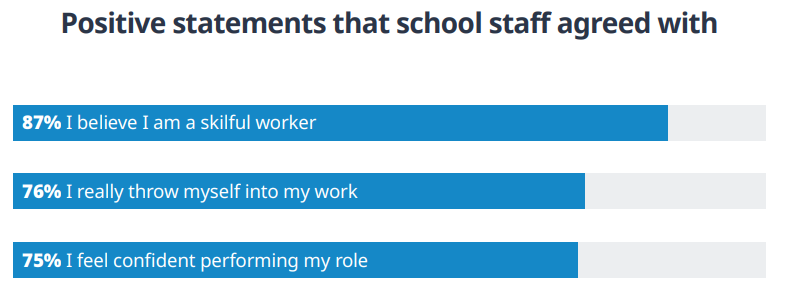
Endean said community appreciation for the role teachers play was boosted significantly during COVID, especially during lockdowns, and their standing has continued to grow through their professional approach.
“As a result, the majority enjoy positive and productive relationships with their students and school environments more broadly. This understandably has an intrinsic relation to confidence in the role they undertake,” he said.
“There will always be a desire for more resources or a greater say in operational matters, however, great teachers recognise their priorities and have an unswerving desire and commitment to achieving the best outcomes for their students.”
Rising workloads: a persistent menace
One of the survey’s less surprising findings was that most (57%) school staff say their workloads have been “unmanageable” over the past year – up from 50% in 2022’s survey.
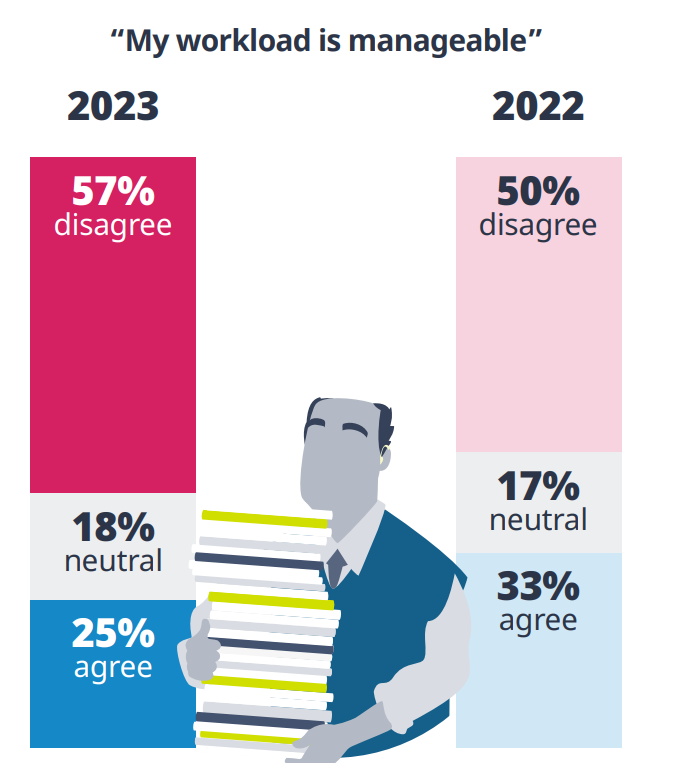
Leaders need to work on judgement
Tim Waley, Executive Consultant at Tes said one of the more surprising findings was that nearly half (45%) of staff feel their leaders don’t make good decisions (up from 39% last year).
“This could be considered surprising because ultimately the positive steps achieved, particularly towards improved staff wellbeing, are the direct result of perceptive and targeted actions by leaders,” Waley told The Educator.
“As always, communication in schools that is open, transparent and engaging will continue to lead towards balanced and relevant improvements across all aspects of the teaching profession.”
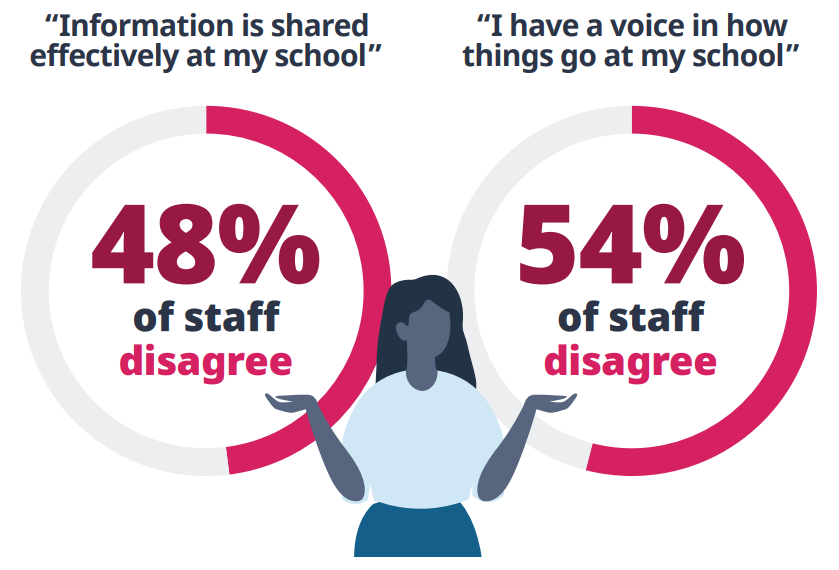
Unheard and uninformed
Around half of respondents (48%) said that information isn’t shared effectively between staff at their school, compared with only 39% who said the same in 2022.
There was also a sharp increase in dissatisfaction around staff voice: some 54% of those in the 2023 survey said they feel they don’t have a voice about how things go in their school, compared with 44% in 2022.
Waley said while the findings are of concern, it is worth considering where schools were only two short years ago in relation to these areas.
“Significant growth and development in levels of communication and consultative leadership across education in Australia has certainly been happening,” he said.
“Let’s give credit where it’s due, our leaders, obviously with some exceptions, have done an incredible amount to address the plethora of wellbeing issues that arose from the pandemic experience. No doubt this finding will be of interest to them.”
Waley said moving forward, the trend towards more inclusive leadership styles will likely see principals adjust where necessary.
“Change takes patience and time, but one thing is certain – for the most part, leaders are generally guiding their schools in right direction.”
Teachers getting by, but wouldn’t recommend the job
Worryingly, nearly half (44%) of staff say they wouldn’t recommend their school as a place to work to friends (up from 37% last year). Just over a third (34%) said that they would, a considerable drop from the 45% who said the same last year.
So, what does this mean for school pride? Interestingly, it remains strong and stable – just as the Tes’ 2022 report found, 55% of respondents said they are proud to work at their school, while only 26% aren't (up from 22% last year).
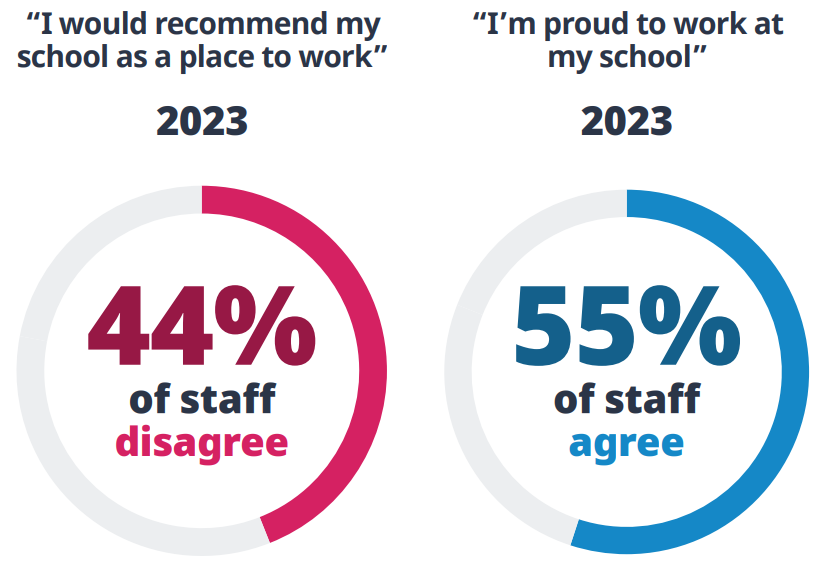
How schools are responding
Fortunately, the report shows schools are taking active steps to address wellbeing, from introducing wellbeing surveys (56%), to offering wellbeing resources to support staff (53%), and investing in staff development (38%).
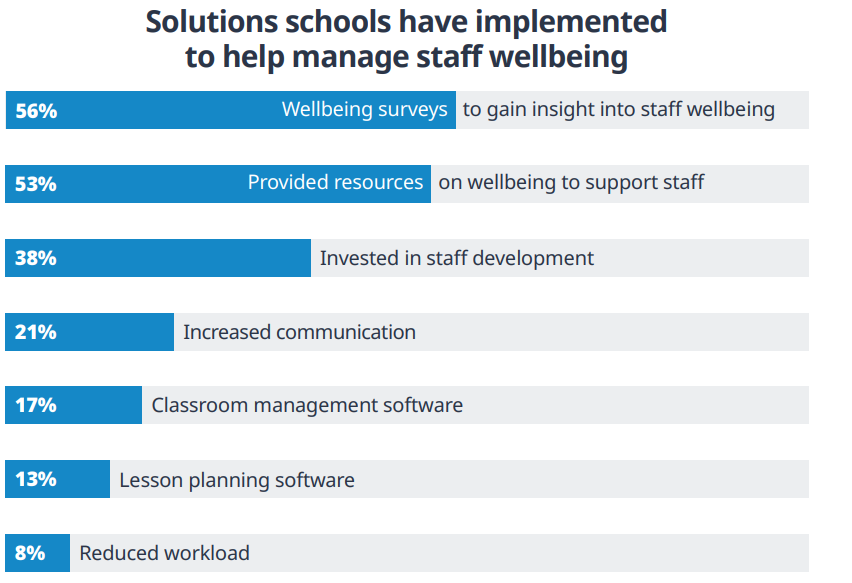
Waley said overall, the survey’s findings should engender confidence.
“Certainly, there remain aspects which require close attention and continued action but when you consider the range of positive initiatives that have been taken around staff wellbeing and professional development, some real gains have been made.”


